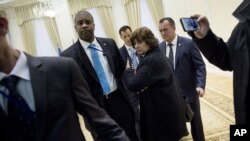The U.S. State Department is reviewing an incident in Uzbekistan in which a reporter was removed from a meeting between Secretary of State John Kerry and Uzbekistan President Islam Karimov on Sunday.
When a Washington Post reporter asked Karimov a question about human rights at the conclusion of the meeting, an Uzbek security agent and an American diplomatic security agent prodded the reporter to leave the room.
“We take this seriously,” State Department spokesman Elizabeth Trudeau said Monday.
But Executive Director of the Committee to Protect Journalists (CPJ) Joel Simon observed that Secretary Kerry “did not even object” as the reporter was escorted out.
Simon told an audience at the Columbia University Graduate School of Journalists Monday evening that Kerry also did not publicly raise Uzbekistan’s poor record on human rights in general, or the rights of journalists in particular, during his visit. Simon said a journalist in Uzbekistan has been imprisoned longer than any other journalist anywhere else in the world, referring to opposition editor Muhammad Bekjanov, who has been jailed since 1999.
Under Secretary of State Richard Stengel told the same forum that the situation is worsening for journalists around the world who “have become combatants in a war zone.”
But he also said “what diplomacy is about is mixed messages,” so that while Kerry may not have objected in public he could well have raised the issue of the reporter behind the scenes.
Stengel said this is the kind of difficult conversation U.S. diplomats are often called on to have behind closed doors. “On the one hand we need to cooperate with you on counterterrorism; but on the other hand you have to do better on repressing… free speech in your own space.”
Simon said that kind of conversation contains an inherent contradiction because the line between the language of terrorism or propaganda and journalism falls on a continuum. “Somewhere along the continuum, these calls get pretty hard to make… and they get exploited by governments around the world who draw that line in a completely different place.”
He said U.S. government efforts on behalf of press freedom and imprisoned journalists have been inconsistent but, “we advocated at CPJ for greater engagement by the U.S. government around the issues of press freedom and on behalf of imprisoned journalists. I do need to say thank you because I have seen a response and I do think that that has happened.” In particular, Simon noted that the U.S. played a role in the release of bloggers imprisoned in Vietnam.











